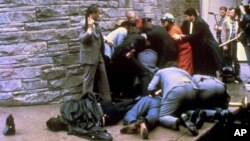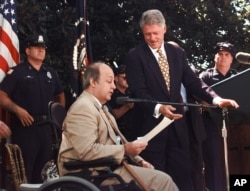Twenty-three years ago today, the U.S. Senate passed the Brady Bill, which required a five day waiting period for the sale of handguns.
The law was inspired by the 1981 shooting of former President Ronald Reagan and the crippling injury of his press secretary, James Brady, who was left paralyzed and confined to a wheelchair by the incident.
The bill was signed into law a few days later by then President Bill Clinton.
The politics of gun control in the United States have since changed dramatically. Activists who champion gun rights have largely succeeded in recent years in rolling back gun restrictions in several states.
Those restrictions have loosened despite a rash of mass shootings in recent years, including the killing of 28 people, most of them young children, at Sandy Hook Elementary School by Adam Lanza in 2012.
At the heart of America's firearms debate is the U.S. Constitution's 2nd amendment, which includes the phrase "...the right of the people to keep and bear arms, shall not be infringed."
For many Americans, exercising the right to own firearms is an expression of patriotism. Those same gun rights activists fear the federal government will pursue overly restrictive laws, curtailing access to firearms or ammunition. Supporters of more restrictions say they will lower the number of gun homicides, which kill 10,945 Americans each year, according to the Centers for Disease Control and Prevention.
The effectiveness of background checks, a key part of the Brady Bill, has been studied: in Connecticut in one case, and Missouri in another.
The upshot?
In Connecticut, a law requiring gun buyers to get permits, which themselves required background checks, was associated with a 40 percent decline in gun homicides and a 15 percent drop in suicides. Similarly, when researchers studied Missouri's 2007 repeal of its permit-to-purchase law, they found an associated increase in gun homicides by 23 percent and a 16-percent increase in suicides.
But those studies looked at background checks for those getting a permit from law enforcement, not a gun shop, to buy a firearm. Not all states have that kind of requirement on the books.
Healer in chief
During his two-terms in office, Obama spoke to the nation in the aftermath of similar mass shootings numerous times. His statements began to reflect his horror and frustration over such violence.
After Sandy Hook, Obama fought back tears, saying "Every time I think of those kids, it gets me mad."
The president used the tragedy to renew past efforts to press Congress to pass a law banning assault-style weapons. But like so many attempts in the past, it ultimately failed.
Last year, a poll by the Gallop organization showed few Americans believe that laws can stop gun violence.
James Brady and his wife, Sarah, spent the rest of his life fighting for stricter gun laws. He died in 2014 at age 73.






